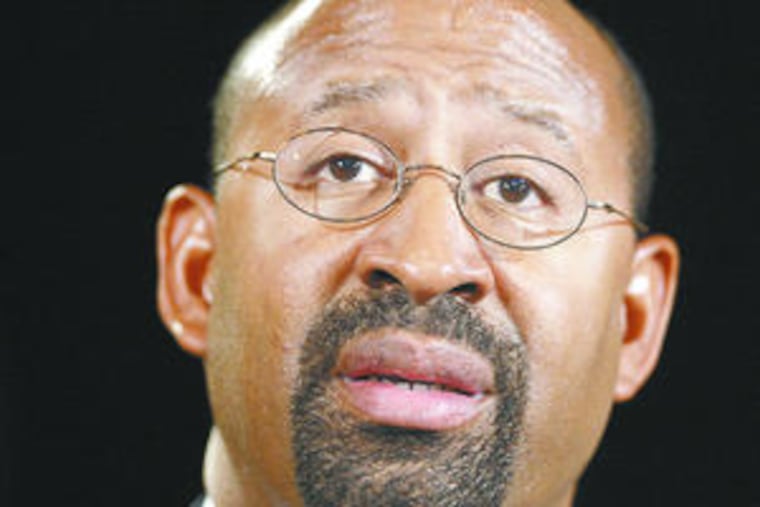Nutter agenda blindsided by economy
Many campaign vows go on hold under the new realities, but the mayor sees some bright spots.

When Mayor Nutter took office in January, the expectations for his administration could not have been higher. Ten months and a $1 billion budget crisis later, should Philadelphians temper their hopes?
Yes and no, Nutter said in a Friday interview.
"I think yesterday was part of the expectation-adjustment process," Nutter said, referring to his Thursday announcement of painful spending cuts and a freeze on planned tax reductions.
But Nutter did not back off his most ambitious goals, such as halving the high school dropout rate within seven years, and doubling the city's four-year college-degree attainment rate within 10 years.
"The goals and the timelines, those are going to stay the same," he said. "You have to continue to drive the organization."
Nutter's problem is that his organization - City Hall - will be seriously short on cash until the economy starts to grow again, something administration budget experts do not expect to happen until 2011, when Nutter's first term will almost be over.
"There's no doubt that what has happened over the last three to six months in the global economy will dramatically influence the mayor's ability to implement the specific promises he talked about when running for mayor," said David L. Cohen, former chief of staff to Mayor Edward G. Rendell and the new president of the Philadelphia Chamber of Commerce.
Although Nutter said his administration tried to preserve his agenda while cutting the budget, his priorities were hit hard nonetheless.
Tax cuts, which Nutter considers essential to job growth, were frozen. Funding for the Community College of Philadelphia was cut by $2 million, and 11 libraries were shuttered - cuts that clearly run counter to his education goals. The park system, which Nutter said was a top priority, will not get the extra money he promised until at least 2011. Even public safety - the hallmark issue of his campaign - was not spared, as the mayor was forced to settle for 200 extra officers on the streets instead of the 400 he had originally budgeted for.
"It seems like he took the core promises he made on his campaign and sacrificed them," said tax-cutting advocate Brett Mandel.
"A lot of people who voted for the mayor voted for him because they thought he was going to carry out those promises, and he even laid out ways to pay for those promises . . . now he is moving away from those promises."
Nutter is certainly not funding his priorities as fully as he had originally planned, but they are getting better treatment than other areas of the budget.
"So we have this incredible economic crisis. We wanted to increase funding to the Community College by $4 million, and we could only do $2 million. That's still an increase. We wanted to put 400 more officers on the street. We ended up only getting 200, which is something, and crime is going down," Nutter said. "You have to make these choices and trade-offs."
In the short term, Nutter's budget-cutting options are sharply limited. More than half of the city's spending is nondiscretionary, locked up in long-term commitments such as pension payments, debt service on old bonds, health-care costs, and funding for offices and agencies that Nutter does not directly control.
Some reformers think the financial crisis has given Nutter a rare chance to shake up that system. They say he can use the bad budget news to leverage the unions into less-expensive health-care plans, or to rally political support to close or consolidate quasi-independent agencies and patronage-rich offices of elected officials such as the City Commissioners and Register of Wills.
Those are herculean and politically fraught jobs. Some would require changes to the City Charter or state approval. Nutter would run the risk of labor strife. And ending patronage at independent agencies would put him at odds with the city's Democratic establishment.
Friday, though, Nutter said his administration had already been working on some big fixes well before the financial crisis began. He cited the forthcoming 311 call center, which the mayor thinks will save the city a lot of money in years to come, and an agreement with unions to explore alternatives to current health-care plans.
But Nutter acknowledged there was increased pressure, because of the fiscal crisis, to address the systemic inefficencies in city government.
"The crushing reality of having less resources to run this place forces you to speed up your timetable, to reshape your thinking about just what should we be doing, what should we no longer do, or what's a better way to do what we've been doing," Nutter said.
In time, he said, it might make sense to consider consolidating quasi-independent agencies and offices.
"Based on good data, study and analysis, if there are ways to improve operations, and save dollars by possibly consolidating some of these external functions that are out there, I'm more than willing to take a look at it," Nutter said.
In the meantime, the mayor is confident that Philadelphians will cut his administration a break as it copes with economic realities well beyond his control.
"Luckily for Nutter, he has built up a lot of goodwill over the last year, and I think because of that, people understand," political consultant Neil Oxman said. "You are going to have some people be ticked, but no one could have foreseen any of this when he was making his promises."
Eventually, everyone expects, the economy will improve, and Nutter will again get the chance to invest in his priorities. And given the reality of Philadelphia politics - where Democrats outnumber Republicans more than 4-to-1 - the odds are good that Nutter will have the chance to serve a second term.
"There will be plenty of opportunity over an eight-year term for the budget to support the kinds of investments he talked about during the campaign," Cohen said.